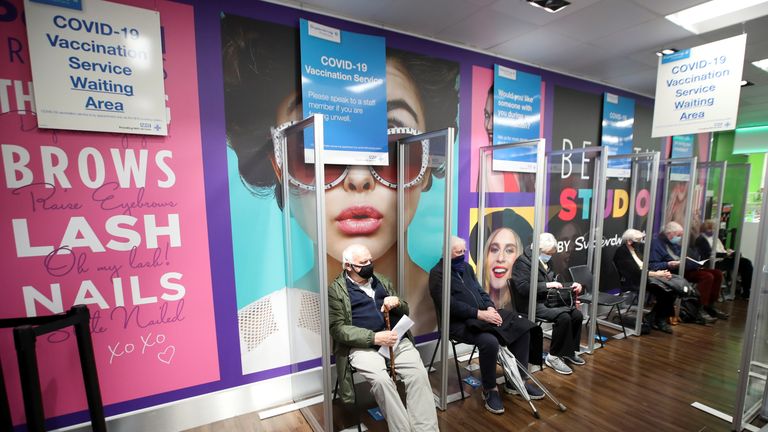COVID-19: How long are you protected for if you’ve already had coronavirus – and are you still a risk to others?
People who’ve had COVID are likely to be protected from reinfection for at least five months and have a similar defence to someone who’s been vaccinated, according to a UK study.
But does it mean those who have recovered are no longer a risk to others? And could the protection last any longer? Here’s what you need to know.
Who did the study follow and is it reliable?
More than 20,000 healthcare workers from 102 NHS trusts across the country, including frontline staff, have been tested since June by the Public Health England (PHE) Siren study.
Some 6,614 of them tested positive for antibodies at the start of the research, suggesting they’d had the virus previously in the first wave.
It’s a big cohort of people so its results are valuable – and the study is still ongoing.
How many people contracted COVID a second time?
There were only 44 potential reinfections from the 6,000-plus found to have antibodies.
Two of them were deemed “probable” cases, while 42 were “possible”, based on the evidence available.
What does it mean for the chances of contracting the virus again?
If all 44 cases are assumed to be confirmed reinfections, the protection rate is 83% compared with those who’ve not had it before.
If only the two “probable” cases are considered, the rate would be 99%, but researchers are going with the headline figure of 83%.
However, PHE says more work is going on to clarify this range.
How long does the protection last?
It appears to be at least five months, on average, from first getting sick.
The analysis of the results was done towards the end of 2020, and the study is still following the participants to see if it lasts longer.
It means people infected in the first wave last spring could now be at risk of getting coronavirus again.
The study’s lead, Professor Susan Hopkins, warned the protection “is not total and we do not yet know how long [it] lasts”.
Despite the uncertainties, Dr Julian Tang – a clinical virologist at University of Leicester – said the results were still “useful and reassuring news” for medics on the frontline.
Subscribe to the Daily podcast on Apple Podcasts, Google Podcasts, Spotify, Spreaker
It’s also important to note that the study was done before the new UK variant – which transmits far more easily – had become widespread.
Scientists are therefore also looking at whether “first wave” antibodies provide protection against it.
How does this ‘natural’ protection compare with vaccines?
Vaccines being rolled out in the UK, such as the Pfizer and Oxford jab, can offer over 90% protection after two shots.
In terms of length of protection, scientists aren’t sure yet – as the vaccines haven’t been around long enough to see how long people are immune for.
The vaccines may also have to be tweaked to deal with new variants of the virus – such as the one that’s been identified recently in Brazil.
If I’ve had COVID before, can I still pass it on?
It’s very possible, and the study’s authors warn that a person with antibodies may still be a clear risk to others.
They say early evidence suggests some people with immunity could carry high levels of the virus in the nose and throat, and potentially pass it on.
Can I be more relaxed if I’ve been infected before?
No – in light of the risk of potentially still being able to spread coronavirus, people must still stick to the law and government guidelines.
PHE stresses it’s “crucial that everyone continues to follow the rules and stays at home, even if they have previously had COVID-19“.
This means continuing to stick to lockdown measures and practise safety protocols such as social distancing, wearing a face covering and regular handwashing.
Will COVID be ‘easier’ the second time, and will I show symptoms?
The two “probable” reinfection cases in the study said their symptoms were less severe the second time – but it’s too early to say for sure.
However, if it were to follow other coronaviruses, a second infection could turn out more minor.
Professor Lawrence Young, a virologist from Warwick Medical School, said studies on common cold coronaviruses indicate that any reinfection “is unlikely to result in severe disease”.
But one notable difference with getting COVID-19 again, appears to be the likelihood of not showing any symptoms at all.
The study found people who were reinfected were significantly more likely to be asymptomatic (66%) than those contracting COVID for the first time (22%), said Professor Paul Hunter, from the Norwich School of Medicine.
Source: Read Full Article



